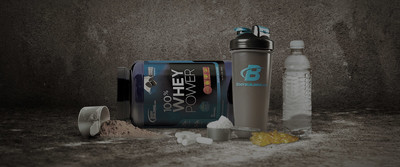This article is very dear to me. I've taken it upon myself to reinstate Milk as the greatest supplement ever. Lately milk often gets a bad wrap among bodybuilders for several reasons... none of which I fully understand. Some claim they get fat, others claim it is too expensive (???) and still others complain of gastro-intestinal disorders. But in my eyes anyone who is not lactose intolerant is selling his gains short if he is not supplementing with milk and a lot of it. I always drank milk, I like it, but I never fully realized its potential as a supplement until I started using it as the cornerstone of my diet and started growing beyond measure. I made the greatest gains of my life on milk, an unrivaled 35 pounds in ten months. If you were to ask me now what I thought was the supplement that gives you the best value for money, I'd say milk. Going back to the 1940's, you'll find that our heroes of yore such as Clancy Ross and John Grimek accredited much of their gains to milk. Clancy Ross even went as far as saying it was the best thing ever to get big. Many of us long for a return to healthy, natural bodybuilding, so why not start by consuming the same things they did?
Convenience
You can get it at any store, it's reasonably cheap to use because it's 90 percent water, it easily replaces all the fattening cokes and sprites you gulp down, or the flat tasteless water you drink to try and meet you hydration demand. You can drink it in the morning, use it in your cereal, use it to water down your soup, but just as easily at night because it isn't heavy on the stomach and has a beneficial effect on your sleeping pattern.
Protein
Drinking anywhere from 1 to 2 gallons a day, depending on how much working out I have to do and taking my protein cycle into account, I use milk mainly for the protein content. A liter of milk (just under 1/3 of a gallon) contains 32 grams of protein coming from two main sources: casein and whey. These are without a doubt the two best proteins available, and in combination with egg protein, supply a complete amino acid spectrum. I don't have to sell bodybuilders on the benefits of whey I suppose. It's the most bio-available protein in the world. It's fast acting and supplies the aminos of the greatest importance to bodybuilders in large amounts. Casein on the other hand is a slower acting protein that contains other essential aminos that provide the base of your body's Amino Acid Pool. By having a mix of the two, the casein influences the whey to act slower and so doing stay active in the body longer and increasing the possibility of absorbing more of it. And because of the aminos present in casein, there is more of a chance that the whey will be stored in muscle-tissue.
If you calculate that 20 percent of milk protein is whey, then drinking 2 gallons supplies me with 30 grams of whey, which is how much most companies recommend you use post-workout. Now most bodybuilders get more protein from different sources, including powders, but getting in an extra serving free seems like a good deal. The total protein in 2 gallons is enough to cover the need of protein of any bodybuilder under 210 pounds. I like to be on the safe side and consume at least 30 to 50 percent more, but still, I couldn't go that high without milk.
Calorie Composition
Ask any nutrition expert, the best diet for bulking up is 50 percent carbs, 35 percent protein and 15 percent fats. Match that up with the content of semi-skimmed milk and you'll find that milk is the perfect nutrition. It could be the cheapest MRP there is. Per liter you get 440 calories, just below what most MRP's supply, giving you 48 grams of carbs, 32 grams of protein and 15 percent fats. Need more proof? What are most kids raised on in the early years of their life? Milk. You start out at a meager 8 pounds, and soon you grow out to a healthy toddler. If only you could keep growing like that, huh? Then why turn your back on the thing that did it? Cow's milk you say? Have you seen the size of the bovine stock? Those things are huge. Cows aren't entirely unlike bodybuilders, they used to be an example of health and then they started using steroids to get bigger. For a growing athlete, taking in as many calories as possible is essential, but you have to watch what you eat to. My milk intake supplies 1300 to 2600 calories a day, from one of the cleanest and purest sources left in a world of pre-packaging, diseases and genetically engineered food. That's anywhere from 60 to 90 percent of my calorie intake depending on the phase I'm in.
Calcium
What are the three most important minerals to a an athlete? Iron, Zinc and you guessed it, Calcium. That's the point of a sports nutritionist. Ask the body and it will say calcium, calcium and calcium. This is clear from the amount of calcium we need as opposed to other minerals and the priority it gets within our systems. If you ingest Calcium and Zinc and Iron (and I've seen one company dumb enough to combine them in one pill), the body will prioritize the calcium over the other two. Which is why sports nutritionists and most smart supplement companies advise athletes to take Iron and Zinc at a time when there is little or no calcium in the stomach. This goes for the Zinc containing supplement ZMA as well.
Calcium is known best of all as a promoter of healthy and strong bones. But it plays a critical role in performance as well. Too little calcium and you can't relax your muscles. Bad relaxation, makes for less potential energy and so on and ultimately for less than satisfactory contraction. Bad contraction equals bad workouts and no growth. Get the picture? By improving relaxation you avoid cramping, injury and twitching. Calcium is also very important in fat metabolization, so no cigar for the people who claim milk is fattening. It makes for less fat storage and better use of present macronutrients in the blood. Using the recommended FDA dosage has shown to decrease body-fat significantly in obese people. It's no secret that the RDV (recommended daily values) were established back in the 60's and 70's for a 2000 calorie diet. I don't know many bodybuilders that grow on a 2000 calorie diet. As a matter of fact I know very few who go below that when dieting. Also the amounts are outdated, so instead of the recommended 1000 mg you should be closer to 2000-2500 grams of calcium daily. Milk can help you get a large part of that. And it's safe to use on a diet too, because of the high calcium content and the not so fattening simple sugar lactose that makes up the carbohydrate portion of milk. And last but not least calcium lowers the blood pressure, may reduce stress and definitely improves the quality of sleep. If that doesn't sell you on milk, I don't know what will. But there is more...
Lactoferrin
It's a small peptide present in milk protein that is very expensive to filtrate and incredibly expensive if you plan to take in a certain amount of it. It's not at all a prominent part of milk, but as I'm fond of saying: every little bit helps. Its importance in immunity is clear, as it is highly present in mother's milk. I'm not going to expand too much on this subject as there are plenty of studies available on lactoferrin, and it's definitely not the most important fraction of milk, but I will say that it plays a key role in digestive functioning, immunity and in reducing cancer-risk. It's also disinfecting within the body and known as one of the greatest anti-oxidants since MSM.
Vitamin D
There is milk available with Vitamin D. Not many people know the relevance of Vitamin D and even less people supplement it, but Vitamin D is a classified steroid-hormone. The most versatile except for cholesterol. Vitamin D is mainly derived from radiation, such as sunlight. So if you are a beach bum chances are you don't need extra, but if you live in an area that gets pretty heavy winters, getting a little extra in this period may be wise. Nowadays the FDA recommends milk be enriched with Vitamin D to prevent bone diseases, but it's a highly anabolic hormone that may be of greater benefit than you think. The basic recommendation is 400 International Units, but as with Vitamin E, getting 800 or so makes more sense.
Well I don't think I need to say anymore do I? Trying to get as much milk as possible is good. Liquid protein if you will that allows you to sip in a few grams at any time during the day. For those of you who can bear it, drink it at room temperature, it's an excellent way of enabling yourself to chug down more of it easier. It doesn't keep as long, but even then it'll keep for three days after being opened and by then you should have chugged down three to six times that. If you are not fond of drinking milk but want part of the benefits, I think taking in a glass or three before bed will go a long way. If you want to be economic about your nutrition, milk should be your first priority. It will save a few bucks that could be used on other supplements or a weekend trip with your wife or girlfriend if you find they suffer under your hectic training regimen.
How to take in more milk:
- Drink it whenever you feel like it
- Take it with your cereal
- Mix all your protein, MRP's or weight gainers in milk
- If you water down soup use milk 5. Cookies and chocolate increase desire for milk
Which milk to use?
Well, semi-skimmed or 2 percent is ideal in most circumstances, because it's practically a meal. It's ideal to be used with meals or shakes, or as a meal by itself. If you are severely underweight take full fat milk. At more than 30 grams of fat per liter it supplies 600 or more calories, as a weight gainer it's definitely the way to go. And naturally if you are on a diet, take in skimmed milk.
One warning though, avoid UHT milk. The high temperature it undergoes destroys much of the nutrients and makes what remains less than bio available. Euperised milk is best. This process can be likened to cold-processing in supplements. A process used to guarantee the best quality with the highest amount of nutrients in supplements. Others are good too, but I estimate you need twice the amount of UHT as you would from other sorts.
I really hope if one of my articles enlightens you, it is this one. You won't believe the anabolic properties of plain milk until you try it. Let's face it, if you have to spend your money on things to improve your bad nutritional habits that leaves little else for products that could really help you grow. A good diet for growing should have milk, eggs, bread, spaghetti and if at all possible red meat. These are the basics, and except for the meat, economically responsible.
So listen to mama and drink your milk, and soon you'll be a really big boy.

